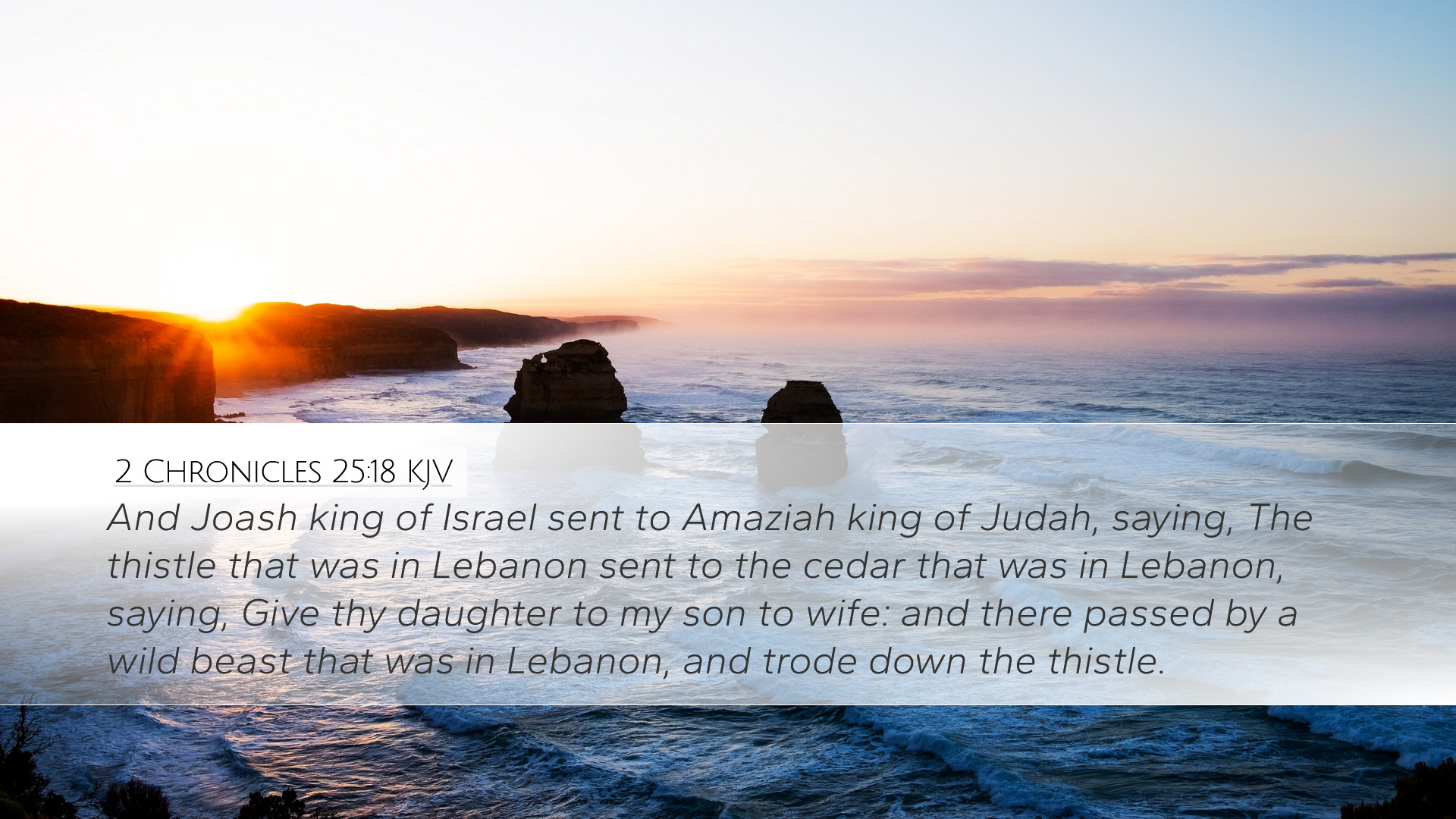Commentary on 2 Chronicles 25:18
2 Chronicles 25:18 tells a critical moment in the reign of King Amaziah of Judah, illustrating the consequences of pride and disobedience in leadership. The verse states:
"Amaziah, king of Judah, took advice, and sent to Joash, the son of Jehoahaz, the son of Jehu, king of Israel, saying, Come, let us face one another in battle."
Contextual Background
To fully appreciate this verse, we should consider the historical and theological context surrounding Amaziah's character and reign. His desire to challenge the northern kingdom of Israel signifies a bold but reckless move rooted in pride.
Insights from Public Domain Commentaries
Matthew Henry's Commentary
Matthew Henry highlights the impulsiveness of Amaziah in seeking conflict with Joash, which reveals a significant flaw in his judgment. He notes that:
- Amaziah’s pride: Henry points to Amaziah’s previous military successes as a source of his overconfidence. After defeating the Edomites, he presumed to further elevate his power by confronting Israel.
- Seeking advice: The king's act of sending a challenge rather than waiting for God's direction illustrates his disregard for divine guidance, emphasizing a theme of human folly over reliance on God.
Albert Barnes' Notes
Albert Barnes elaborates on the implications of this confrontation. He emphasizes:
- The division of Israel and Judah: The historical context of the kingdoms is essential. The animosity and division bred from the separation significantly clouded Amaziah's judgment.
- Call for repentance: Barnes suggests that Amaziah's aggressive approach can be interpreted as a failure to recognize his own need for divine favor. Instead of repentance, he sought battle, showcasing a lack of spiritual insight.
Adam Clarke’s Commentary
Adam Clarke provides a practical application of the text, discussing how leaders today might reflect on Amaziah’s actions:
- The danger of ambition: Clarke warns of the perils of unchecked ambition in leaders, indicating that this ambition often leads to destructive decisions that can have severe consequences for a nation.
- Warfare as a last resort: Clarke advises that approaching conflicts in a spirit of humility, rather than confrontation, is crucial for peace in leadership.
Theological Themes
Several important theological themes arise from the analysis of this verse:
- The folly of pride: The text paints a vivid picture of how pride can blind leaders to the realities of their situation, leading to rash decisions.
- The importance of seeking God’s will: Both individual believers and leaders must prioritize seeking God’s guidance in all matters, especially in times of conflict.
- The divided kingdom: The internal strife between Israel and Judah represents not only a historical division but also a spiritual challenge that God’s people must navigate, calling for unity under His sovereignty.
Application for Today’s Readers
For pastors, theologians, and students of the Bible, this passage serves as a cautionary tale. Here are some applicable reflections:
- Leadership accountability: Just as Amaziah was accountable for his decisions, modern leaders must foster humility and a posture of dependence on God.
- Caution in conflict: Rushing into battle, whether literal or metaphorical, should be approached with prayer and counsel, recognizing the gravity of leadership decisions.
- Self-awareness and humility: Reflecting on personal motivations and the state of one’s heart is essential to avoid the pitfalls of pride that Amaziah exhibited.
Conclusion
2 Chronicles 25:18 encapsulates a pivotal moment that underscores the complexities of leadership. It challenges readers to consider the weight of their decisions in the light of divine expectation and personal integrity. The insights of Henry, Barnes, and Clarke collectively serve to remind current and aspiring leaders of the necessity to tread carefully, seeking divine wisdom above personal ambition.


